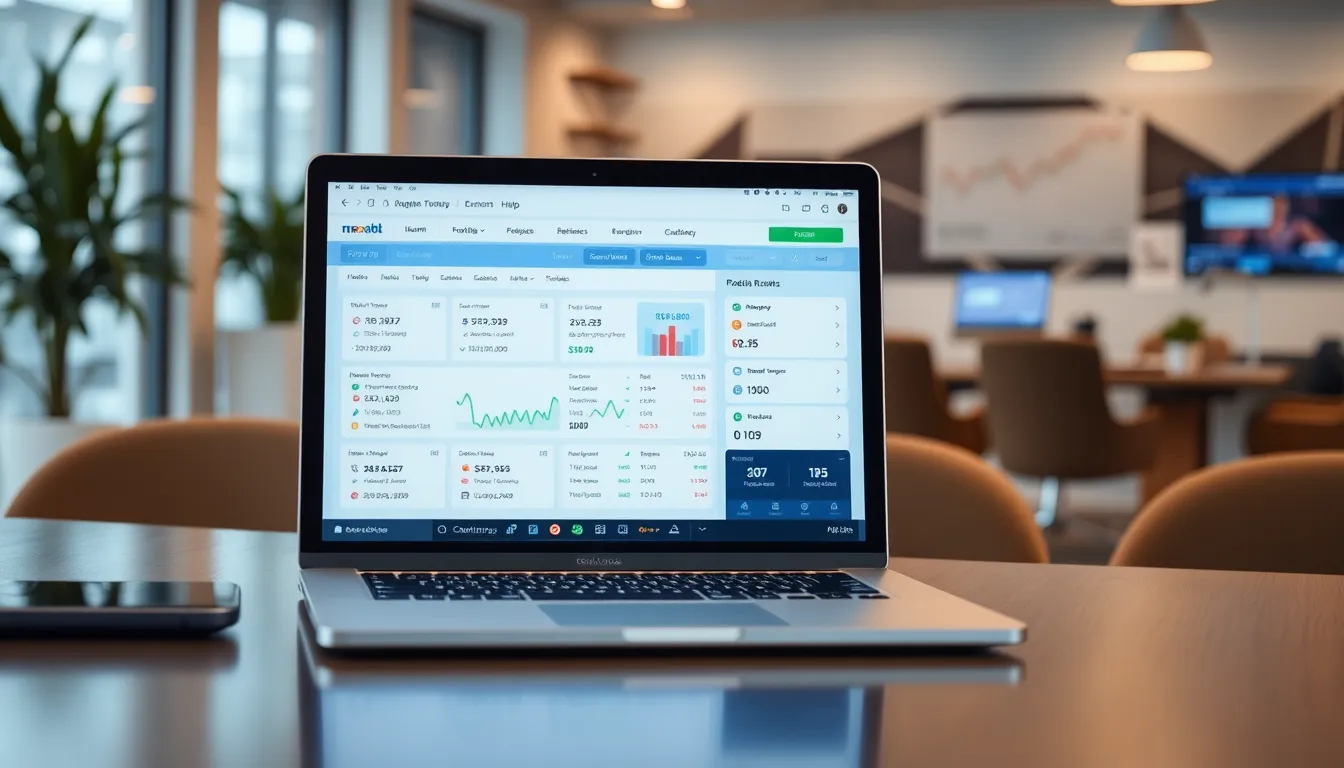In a world where digital coins are becoming the new gold, cryptocurrency exchanges are the bustling marketplaces where fortunes are made and lost faster than you can say “blockchain.” If you’ve ever thought about diving into the crypto craze, you’re not alone. Millions are trading, investing, and occasionally losing their lunch over the latest meme coin.
But fear not! Navigating the wild west of cryptocurrency doesn’t have to feel like a game of roulette. With the right exchange, you can trade like a pro and keep your sanity intact. Whether you’re a seasoned trader or a curious newbie, understanding how these platforms work is essential. Buckle up as we explore the ins and outs of cryptocurrency exchanges, turning you from a confused spectator into a savvy trader ready to tackle the crypto market head-on.
Table of Contents
ToggleOverview of Cryptocurrency Exchanges
Cryptocurrency exchanges serve as platforms for buyers and sellers to trade digital assets. These exchanges accommodate various cryptocurrencies, including Bitcoin and Ethereum, making it easy to exchange one for another. Traders can engage in spot trading for immediate transactions or opt for futures trading, allowing speculation on future prices.
Centralized exchanges manage order books and facilitate trades through a trusted third party. Such exchanges often attract users with their high liquidity and user-friendly interfaces. Decentralized exchanges, on the other hand, enable peer-to-peer trading without the need for intermediaries. Users maintain control over their funds, enhancing security and privacy.
Market types include brokerage services that simplify buying and selling processes, catering to beginners. Professional traders may prefer decentralized finance platforms that support automated trading strategies and yield farming, maximizing potential returns. Various exchanges offer unique features, such as staking rewards or advanced trading tools.
Security remains a critical consideration when selecting an exchange. Users should evaluate exchange regulations, security protocols, and past breaches. This evaluation helps ensure a safe trading environment and mitigates risks associated with potential hacks.
Fees vary significantly across different platforms. Traders must consider transaction fees, withdrawal fees, and deposit fees before committing to an exchange. Comparing fee structures empowers users to make informed decisions tailored to their trading habits.
Liquidity plays a vital role in overall trading efficiency. Higher liquidity leads to faster transactions and better price stability. Therefore, selecting an exchange with a strong user base can significantly enhance trading experiences, especially during volatile market conditions.
Types of Cryptocurrency Exchanges

Cryptocurrency exchanges come in various types, each catering to different trading needs and preferences. Understanding these differences helps users select the right platform for their strategy.
Centralized Exchanges
Centralized exchanges, often known as CEXs, serve as intermediaries for cryptocurrency trading. Users rely on these trusted platforms to manage trades, ensuring high liquidity and fast transactions. Popular examples include Binance, Coinbase, and Kraken. Regulators typically oversee these exchanges, which helps enhance security. Most users enjoy the user-friendly interfaces that simplify the trading process. Trading fees vary among platforms, affecting overall costs. Centralized exchanges often feature robust customer support, making them ideal for beginners seeking guidance.
Decentralized Exchanges
Decentralized exchanges, or DEXs, enable peer-to-peer transactions without the need for a central authority. Users maintain full control over their funds while trading directly with one another. Platforms like Uniswap and SushiSwap exemplify this model. Typically, trading fees on DEXs are lower compared to centralized counterparts. These exchanges emphasize user privacy and security, appealing to those who prioritize following their own protocols. Liquidity can vary significantly across different DEXs, influencing trading efficiency. Advanced traders often prefer these platforms for flexibility in executing strategies.
Factors to Consider When Choosing a Cryptocurrency Exchange
Selecting the right cryptocurrency exchange involves multiple factors that can affect trading success and security.
Security Features
Security plays a vital role in exchange selection. Look for platforms that employ strong encryption methods and two-factor authentication. They should also have a history of protecting user assets. Check if the exchange complies with regulations and routinely undergoes security audits. High-security exchanges often store the majority of funds in cold wallets to minimize risk. Understanding these security protocols helps safeguard investments.
User Interface and Experience
The user interface significantly impacts trading efficiency. A well-designed platform ensures users can navigate the exchange with ease. Evaluate whether the exchange offers a mobile app for trading on the go. User-friendly interfaces often include helpful features like real-time charts and customizable dashboards. Additionally, consider whether the platform provides educational resources, as these can enhance the overall user experience, especially for newcomers.
Fees and Charges
Fees and charges vary widely between exchanges and can affect profitability. Investigate trading fees, withdrawal fees, and deposit fees, as these can accumulate quickly. Some exchanges offer discounts based on trading volume or specific payment methods. Understanding the complete fee structure upfront helps traders make informed decisions. Low-cost platforms are appealing, but consider the trade-offs in terms of security and customer support.
Popular Cryptocurrency Exchanges Reviewed
Various cryptocurrency exchanges cater to different trading needs, and understanding their features helps in making informed decisions.
Binance
Binance stands as one of the largest cryptocurrency exchanges globally. It offers a vast selection of over 500 digital assets, including leading cryptocurrencies like Bitcoin and Ethereum. Users benefit from low trading fees, starting at 0.1 percent, which appeals to high-frequency traders. Advanced trading tools and options, such as futures and margin trading, accommodate experienced traders. Security features include two-factor authentication and withdrawal whitelist options. Its mobile app enhances accessibility, allowing traders to manage their portfolios on the go effortlessly.
Coinbase
Coinbase is known for its user-friendly interface, making it ideal for newcomers to the crypto space. It supports a wide range of digital currencies, including Bitcoin, Ethereum, and Litecoin. Users appreciate the straightforward buying and selling process, with fees varying based on transaction type and payment method. Advanced features like Coinbase Pro accommodate experienced users seeking to trade with more control over their strategies. Security measures prioritize user safety, featuring insurance coverage for digital assets and robust security protocols. Educational resources available on the platform help users understand the market better.
Kraken
Kraken ranks as a reputable exchange known for its strong security measures and wide selection of cryptocurrencies. Users can trade over 200 digital assets, including obscure altcoins. Competitive trading fees, typically starting at 0.16 percent, cater to a diverse range of traders. Advanced trading features like futures and margin trading are available, appealing to professional traders. The platform emphasizes security, with a history of safeguarding user funds effectively. Users also benefit from a comprehensive support system that addresses queries and issues promptly.
Future Trends in Cryptocurrency Exchanges
Emerging technologies will shape the future of cryptocurrency exchanges significantly. Decentralized finance, or DeFi, continues gaining momentum. Users increasingly favor DEXs for their autonomy and reduced reliance on intermediaries.
Artificial intelligence plays a crucial role in enhancing trading algorithms. Advanced algorithms provide real-time market analysis, allowing traders to make informed decisions. Developers will implement AI tools to optimize trading strategies and detect market trends.
Regulatory frameworks evolve, offering clearer guidelines for cryptocurrency exchanges. Improved regulations foster greater trust among users. This trust, in turn, encourages wider participation in digital asset trading.
Additionally, cross-platform integration becomes vital. As users demand seamless access to various exchanges, multi-chain interoperability gains importance. These integrations enhance user experiences by simplifying asset transfers and trading processes.
Mobile trading applications will continue to rise in popularity. Users seek convenience and accessibility. As a result, exchanges will prioritize developing user-friendly mobile platforms.
Environmental considerations are also a growing concern. Developers are exploring sustainable practices, including energy-efficient blockchain technologies. Exchanges committed to reducing their carbon footprint may attract environmentally conscious users.
The trend of tokenization shows promising growth. Real-world assets, such as real estate or art, will increasingly get tokenized on exchanges. This trend democratizes access to investments that were previously exclusive to wealthy individuals.
Lastly, social trading features grow. Users can mimic experienced traders’ strategies, facilitating easier entry for beginners. This approach creates a more inclusive environment in the cryptocurrency trading landscape.
Understanding cryptocurrency exchanges is essential for anyone looking to dive into the world of digital assets. With the right knowledge and tools, traders can navigate this dynamic marketplace confidently. As the landscape continues to evolve with advancements in technology and changing regulations, staying informed will be key.
Whether opting for centralized or decentralized platforms, users should prioritize security, fee structures, and liquidity to enhance their trading experience. The future holds exciting possibilities for cryptocurrency exchanges, and being prepared will empower traders to seize opportunities as they arise. With the right approach, anyone can become a savvy participant in the ever-changing crypto market.





